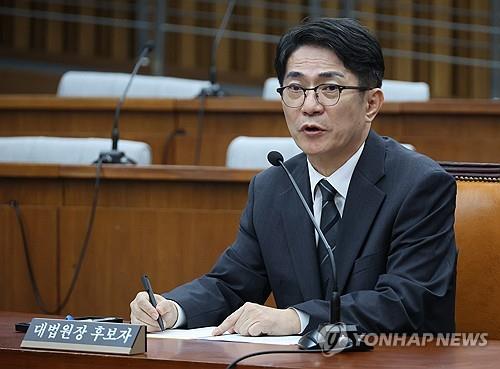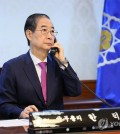- California Assembly OKs highest minimum wage in nation
- S. Korea unveils first graphic cigarette warnings
- US joins with South Korea, Japan in bid to deter North Korea
- LPGA golfer Chun In-gee finally back in action
- S. Korea won’t be top seed in final World Cup qualification round
- US men’s soccer misses 2nd straight Olympics
- US back on track in qualifying with 4-0 win over Guatemala
- High-intensity workout injuries spawn cottage industry
- CDC expands range of Zika mosquitoes into parts of Northeast
- Who knew? ‘The Walking Dead’ is helping families connect
National Assembly rejects Supreme Court chief justice nominee for 1st time in 35 years
The opposition-controlled National Assembly rejected Supreme Court Chief Justice nominee Lee Gyun-ryong on Friday, marking the first such rejection in 35 years.
Lee’s nomination was voted down in a 118-175 vote with two abstentions, shortly after the main opposition Democratic Party (DP), which has a controlling majority in the Assembly, made it a party policy to reject the nomination.
The presidential office immediately expressed regret.
“It is extremely regrettable that an upright and competent judge was rejected to create an unprecedented long-term vacancy in the judiciary,” presidential spokesperson Lee Do-woon said during a press briefing. “The people are the victims, and therefore, this can only be described as a political fight that holds the people’s rights hostage.”

The DP has opposed Lee, a judge at the Seoul High Court, citing several allegations and his alleged personal connections with President Yoon Suk Yeol.
It marks the first such rejection since 1988, when the nomination of Chung Ki-seung was voted down.
This also marks the first time that the Supreme Court is led by an acting chief justice since 1993, when then Chief Justice Kim Deok-ju resigned over a real estate speculation scandal.
It would take at least about a month for Yoon to name a new nominee.
After serving as a judge for about 30 years, Lee was nominated for the top court chief in August to replace Kim Meong-su, whose six-year term ended last month.
The ruling People Power Party has argued that Lee is fit for the job and is the right person to normalize what it claims is the politicization of the judiciary during Kim’s tenure, citing Kim’s progressive tendencies.
But the DP has also taken issue with Lee’s past rulings, where he reportedly reduced the sentences of offenders of sexual crimes or domestic violence multiple times.
Additionally, Lee also faces accusations of purposefully underreporting assets he and his family owned for many years in the annual asset disclosure of high-ranking government officials while he served as a high court judge.
In a message sent to reporters Thursday, Lee asked for the confirmation of his nomination and requested an opportunity, expressing concern that the Supreme Court’s en banc hearings and rulings will be virtually impossible in case of a leadership vacuum.
The ruling People Power Party (PPP) also denounced the DP’s decision and held a protest rally.
“The DP’s organized obstruction of justice … has escalated to the point of causing a judicial paralysis and a constitutional crisis,” said the PPP’s leader Kim Gi-hyeon. “If the party is at least concerned of the human rights of victims, the promotion of justice and the punishment of criminals, it would not engage in such reckless behavior.”

Additionally, the chamber passed a motion to designate a bill on the death of a young Marine during a post-flood search operation in July as a “fast-track” bill, which requires expedited deliberations, in a 182-1 vote.
The bill, proposed by the DP, calls for a special counsel investigation into the death of Cpl. Chae Su-geun, who was swept away by an overflowing stream in Yecheon County, 161 kilometers southeast of Seoul, on July 19 while on a mission to search for victims of downpours.
Members of the PPP did not participate in the vote, protesting that the motion was being pushed for unilaterally.











